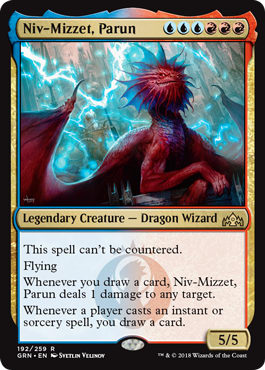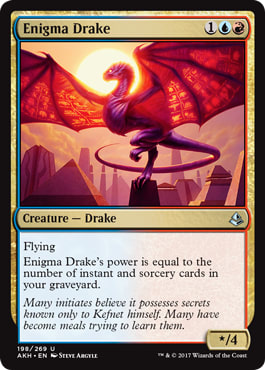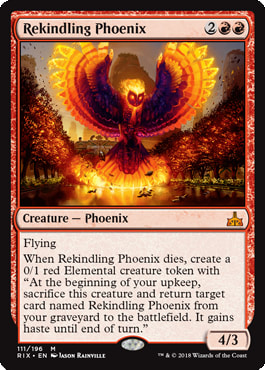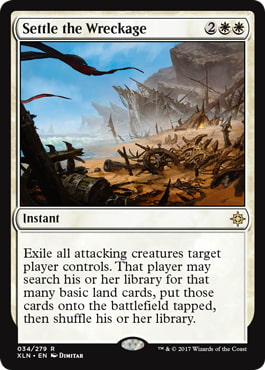Wisconsin Magic
Anyone who knows me well knows how much I love Magic.
I started playing Magic in 1993 in a small western Wisconsin town of about 50,000. Growing up in La Crosse was an incredible experience, and I'm thankful to have lived in such a vibrant, beautiful community.
When I turned 18, I went to UW-Madison for college and continued to be lucky: Madison, as it would turn out, was already an incredible place for Magic, with an unparalleled Limited scene. For my first PTQ, I went up with a crew of five Madison guys to Minneapolis; I was the only one of the five of us not to make Top 8, and my friend Jim Hustad would win it all.
Jim was an important figure in my early Magic life. Early on in my time in Madison he spent all night beating me at Magic and showing me just how bad I actually was. It's a good lesson, and one that I think we forget too often as we improve. Some people have downplayed it when players like my former teammate Paul Rietzl have claimed they are "bad at Magic" when they are among the best in the world, but to me, what I hear him saying is an acknowledgment that not only was he making mistakes, but that we should never imagine we've transcended "being bad". Jim, crushing me endlessly, made it clear how much I had to improve, and it is with that sense of a desire to get better that I grew into tournament Magic.
Less than an hour and a half away, Milwaukee, as a Magic city, seemed quiet. It was only until a sudden emergence of Magic veterans hit the regional scene that we became aware of the players. At the time they were led by luminaries like Brian Kowal or Jacob "Danger" Janoska, but eventually other names would be added to the mix: Owen Turtenwald, Dustin Stern, Mike Hron (until we stole him here in Madison), and more. I was lucky to be friends with a lot of the early crew of Milwaukee area Magic because of my connections to Brian Kowal and Jacob Janoska, and so I got to know a ton of the old-school Milwaukee Magic crowd, especially the VGC crowd, a popular place to play Magic back in the day in Milwaukee-land.
During the coverage prep at Grand Prix Milwaukee this last weekend, Brian David-Marshall asked me if I was finally going to stop putting "two-time Wisconsin State Champ" on my list of accomplishments; "no way!" I replied. The strength of the community in Wisconsin was always a huge point of pride for all of us from here, starting with the first champion in 1997, Rob Castro, who at this point you may have seen at a Pro Tour or two. We had two previous Wisconsin State Champions in the Top 8 at Milwaukee - me and Owen Turtenwald - but we almost had three, in Lucas Duchow, who just missed Top 8.
The night before I left for the tournament, my roommate Kaity told me she was headed "up north" for deer hunting; I told her I was heading to Milwaukee for the Magic tournament. "Go win it," she said; "Bag a huge buck," I said.
It was pretty amazing feeling to come back on Sunday with us both having done it.
Winning a title - any title - is a big deal. But given all of this history, having my first major Magic title be "Grand Prix Milwaukee Champion" feels damned phenomenal.
The Brew
Any deck brew that wins has at least a little luck going for it. Hopefully, though, it will also have something sound behind it that gave it an edge that was meaningful.
Here is the list I played:
Jeskai Hybrid Control | Guilds Standard | Adrian Sullivan, 1st Place, Grand Prix Milwaukee
- Creatures (7)
- 1 Rekindling Phoenix
- 2 Enigma Drake
- 4 Niv-Mizzet, Parun
- Planeswalkers (3)
- 3 Teferi, Hero of Dominaria
- Spells (25)
- 1 Settle the Wreckage
- 1 Shock
- 1 Spell Pierce
- 2 Dive Down
- 2 Ionize
- 2 Syncopate
- 3 Expansion // Explosion
- 4 Opt
- 2 Lava Coil
- 3 Deafening Clarion
- 4 Treasure Map
- Lands (25)
- 5 Island
- 4 Clifftop Retreat
- 4 Glacial Fortress
- 4 Sacred Foundry
- 4 Steam Vents
- 4 Sulfur Falls
- Sideboard (15)
- 2 Seal Away
- 2 Ixalan's Binding
- 1 Settle the Wreckage
- 1 Cleansing Nova
- 2 Lyra Dawnbringer
- 1 Disdainful Stroke
- 1 Negate
- 1 Spell Swindle
- 2 Star of Extinction
- 2 Banefire
I am not confident that the sixty-card main deck is perfect, let alone the 75. I got to where I got to by the time Friday night rolled around, and at a certain point, you just have to push "submit". The lands are the worst thing about the deck, though I think when the next set arrives, Hallowed Fountain will change the world. The last few cards that jumped around in the main deck included Chemister's Insight (sometimes Pirate's Pillage), another Deafening Clarion, another Lava Coil, and another Shock. The final build, after all is said and done, feels pretty damned good, and I'd be saying that even if I hadn't won the whole event.
Sometimes you just know that a deck is breaking ground beyond what is happening otherwise in a format; I recall Paulo Vitor Damo da Rosa working on Seismic Swans for Brazilian Nationals - though I didn't have the doubts about my deck that he did about his. Even if things aren't perfect, sometimes they don't have to be; I've long talked about Charles Gindy's ![]()
![]() Elves deck for Pro Tour Hollywood being a flawed build while also being the best choice for the tournament, winning because the way that the deck fundamentally functioned was just a superior thing to its competitors.
Elves deck for Pro Tour Hollywood being a flawed build while also being the best choice for the tournament, winning because the way that the deck fundamentally functioned was just a superior thing to its competitors.
That's how I felt about this deck. One old naming convention I have for decks is to include "Chevy" in the title if it is a spin on an existing archetype which just outstrips the regular builds (this convention making its way into Chevy Fires of Pro Tour Chicago, Chevy Blue, Chevy Elves at the US Nationals Sam Black made Top 8 with my deck, and more). This was a "Chevy" Deck.
What set it apart was a fundamental thing: understanding Niv-Mizzet, Parun.
Typically, a control deck has inevitability, Zvi Mowshowitz's term for having an advantage as the game goes to a nearly infinite inevitable conclusion. You see decks built for this advantage all the time. Teferi, Hero of Dominaria and Search for Azcanta are both very powerful at this inevitable point.
However, Niv-Mizzet, Parun is simply so powerful, choosing to "inevitably" kill your opponent is giving it short shrift. Niv-Mizzet is fully capable of killing practically immediately.
If you build your deck for a slower game (Sinister Sabotage over Ionize), you will miss out on the opportunity to kill the opponent. Niv-Mizzet with protection on turn five via Treasure Map can deal twelve damage after hitting play by the next turn. Niv-Mizzet with protection on turn seven can deal sixteen.
Once you know this, you stop seeking the inevitable endgame.
The technical term for this kind of game plan, in the realm of strategic archetypes, is Hybrid Control. We've seen it before, but only rarely, in the form of Lorwyn Block Faeries, Vintage Oath, or Sneak and Show; these decks play the control game for a varied amount of time (depending on the power of the format) before exploding out into a new demand of the opponent: see if you can survive under a very short clock - similar to the other mixed strategy of aggro-control, which drops immediate threats, and then controls the plays of the opponent just enough for the kill.
You could build a Niv-Mizzet, Parun deck as more of a midrange control deck or pure control deck, but doing so would not be playing Niv-Mizzet to its utmost.
From here, a ton of the decisions just fall into place. You want enough one-cost spells to make Niv as good as possible. You want enough unconditional counters that they don't rot in your hand, so Syncopate starts getting the nod. You want enough card draw and selection to get out a Niv and protect it. The controlling spells you only want enough of to survive.
I made the controversial claim that Enigma Drake is better than Crackling Drake in the controlling decks. The cost of four versus three is one of the reasons that I made this claim. This was apparently, to some, undermined by my playing of Rekindling Phoenix, but the explanation is a simple one of real estate.
Ultimately, Enigma Drake is better than Crackling Drake because, versus aggressive decks, the discount on the cost is simply more important than a card, which, with four Niv-Mizzet, Parun, you'll make up at some point. Versus control decks, tapping four mana is a scary proposition, and can lead into a sequence of events where your opponent has a Teferi, Hero of Dominaria in play.
So why the Rekindling Phoenix? Rekindling Phoenix, to me, is simply the other "better" Crackling Drake. Where Crackling Drake gives you a card immediately, when your opponent kills it, it is just gone. However, with Rekindling Phoenix, you are given "the free card" when they try to kill it without exiling it, except for this time, the burden is on your opponent to deal with it again. Some decks really struggle with this.
I'd initially had many Rekindling Phoenix in the deck, but after a long while, Lava Coil and other more permanent answers were just becoming a huge part of the metagame. Rekindling Phoenix costing four was too much of a burden, and I moved it to the sideboard for when it was most useful. It came back to the main deck as a singleton as a means to tighten the sideboard, punting a third Enigma Drake out of the deck because they were in many ways analogous, but the upside of Rekindling Phoenix could give the opportunity for some insurmountable games.
I cut the fourth Deafening Clarion from the deck after choking on the card too often, but I still felt like I needed removal. This is especially the case with Adanto Vanguard running around. Settle the Wreckage, particularly as a singleton (thanks, LSV!), can be a devastating card. The tension between playing around it and not playing around it becomes palpable if you ever are putting someone to the test. Importantly, it is also an instant, which was relevant many, many times, including once to kill an opponent exactly for the match.
Friday Preamble
Late into Friday, I talked to Ian Degraff about the final choices. I wanted to include a second Shock, but I couldn't figure out where. I wanted to cut a fourth Deafening Clarion. I wasn't certain about Settle the Wreckage. I finalized the most important choice: solidifying that fourth Treasure Map in the list.
Comfortable in my own bed, I tried to get some sleep, ready for the morning drive of 72 minutes, door-to-door, for the Grand Prix.
Armed with about four hours of sleep, I marched into Day One with two byes.
The Event
Round 3, Win 2-0 vs. David Tryggestad with Boros Midrange
David is from Hawaii, and his deck has a lot of controlling choices that give me plenty of time. Despite answering Niv many times, the explosive damage is too much, with one game including a turn five-to-six twelve point burst of damage that was clearly too much for him.
3-0
Round 4, Lose 1-2 vs. Craig Rocco with Golgari Midrange
In the first game, I hit him "from out of nowhere" to dead. In the second, I make a horrid set of errors, by first boarding in Lyra Dawnbringer where it has no business coming in, then dropping it into play instead of using Settle the Wreckage, putting myself to dead if Craig has two removal spells (which he does). Anticlimactically, my mana issues decide the match.
3-1
Round 5, Lose 1-2 vs. Michael Simon with Selesnya Tokens
I stabilize quite quickly in the first game, and dismantle Michael. The next two games, however, both fall apart as non-games, with mana issues deciding them, the first because I kept having lands come into play tapped, and the second because I couldn't find a second White for my numerous removal spells.
3-2
This was a demoralizing beginning in some ways, but I trusted the deck, and I soldiered on.
Round 6, Win 2-0 vs. Mohamad Qadi with Esper Control
This matchup showcased the power of Niv Mizzet to me: my opponent got out Teferi and flipped their Search for Azcanta in the first game, but couldn't win, despite answering Niv-Mizzet, in some way or other, four times. The card is so powerful in controlling matchups it warps the game completely.
4-2
Round 7, Win 2-1 vs. Blythe Mulligan with Golgari Midrange
Blythe was an awesome opponent who totally crushed me in Game 2 with Golgari Raiders hastily finishing me off after I tapped out on turn five with a Treasure Map fueled Star of Extinction that I thought was going to end the game. Still, the natural advantage of the deck held the match in the final game, with numerous powerful removal spells taking care of her armies.
5-2
Round 8, Win 2-1 vs. Nick Newcombe with Jeskai Control
Just because the deck has an advantage versus control matchups, doesn't mean that the games are completely impossible to lose. Crackling Drake took me down in the second game with some tempo-controlling counters to keep me from getting back into the game. The third was ended by Banefire.
6-2
I drove home to Madison for the pleasure of sleeping in my own bed, watched a movie, and tried to get as much sleep as I could. I think I manage about five.
Round 9, Win 2-1 vs. Justin Brickman with Izzet Drakes
The first game had him devastated by me answering some threats and getting a fast Niv-Mizzet into play. The second went more slowly, but a Murmuring Mystic from Justin took me down. The final game involved a crazily complicated board, but the unstoppable Banefire ended it.
7-2
Round 10, Win 2-0 vs. Gregory Michel with Izzet Drakes
I pretty thoroughly suppress Gregory, using a fast Niv-Mizzet both games to keep him from doing anything particularly useful.
8-2
Round 11, Win 2-1 vs. William Holtzman with Boros Aggro
The first game is exciting, with Expansion on Heroic Reinforcements keeping me barely in the game until I was able to take him from 14 to 0 in a turn with Niv-Mizzet. The second game I died to my lands coming into play tapped, but I think I would have won with my removal had that not been the case. In the third game, I fight really hard to keep alive, with Deafening Clarion taking me from one to six, hoping to pull me out of Banefire Range, but still in dire risk of death when I ultimate Teferi and Explosion for ten to nuke all of his lands.
9-2
Round 12, Win 2-0 vs. Mark Kelley with Jeskai Control
I simply have more access to Niv-Mizzet, and he can't keep up.
10-2
Round 13, Win 2-0 vs. Thiago Casassanta with Golgari Midrange
He double mulligans in both games, and in the second game I cast my largest Explosion in the tournament, hitting him for 18.
Watch Grand Prix Milwaukee - Day 2 - Standard from Magic on www.twitch.tv
11-2
Round 14, Win 2-1 vs. Lucas Duchow with Jeskai Control
We go to three good games, easily winning the first, handily being destroyed in the second by a Legion Warboss and my own bad mana, and with me barely taking the last game, catching a real break in the final instance because despite having placed a Dive Down in the graveyard, the stack hadn't descended to it yet, allowing me to copy it. As in the other Jeskai matches, the extra Niv-Mizzet were just huge.
12-2
Round 15, Win 2-0 vs. Steve Shields with Jeskai Control
Like most of these matches, so long as I didn't die to a sideboard attempt at winning like an aggro-control deck, Niv-Mizzet just bullied them out of the way.
13-2
Top 8, Win 2-1 vs. Adam Hernandez with Golgari Midrange
I don't recall of this match, as I had started running completely out of gas. Thankfully, I was able to take a much needed nap before the Top 4, though I still felt exhausted.
Top 4, Win 2-1 vs. Isaak Krut with Jeskai Control
You can watch the match here:
Watch Grand Prix Milwaukee - Day 2 - Standard from Magic on www.twitch.tv
Finals, Win 2-0 vs. Brian Lynn wit Golgari Midrange
Watch Grand Prix Milwaukee - Day 2 - Standard from Magic on www.twitch.tv
I frankly don't remember much of the details of these last two matches, though I've re-watched them a few times. I'm told that I might have been the reason for killing all of the dinosaurs, but whatever the case may be, I'm glad that the meteors came down.
D�nouement
I fell off of the Pro Tour at Pro Tour Kaladesh. I loved my deck selection for that event, but I'd made some bad choices at events before that. I still remembered how it felt, directly after it all, as I soaked up how it felt that my run on the PT was over. It is great to be back.
One thing that is in the plan moving forward is to start streaming! I haven't bought the equipment or set anything up yet, but I hope to begin the baby steps of it all next week after Thanksgiving. I've done a lot in Magic, but streaming games isn't one of them, so I'm going to be looking forward to growing in this with our amazing Magic community.
This is all new to me, so you can see me go from baby steps to much more as things get going!
Thanks for all the support, everyone. It means the world.
Next week, look for more on the inner workings of the deck and Hybrid Control in general!
Follow me on Twitter! @AdrianLSullivan
Follow me and subscribe on Twitch! /AdrianLSullivan

























